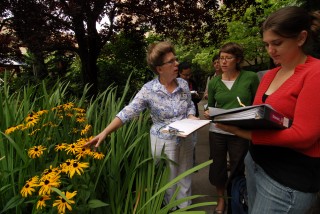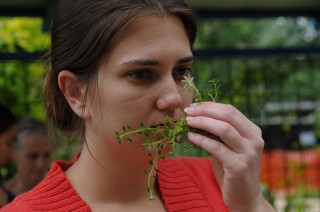This content was published: July 15, 2010. Phone numbers, email addresses, and other information may have changed.
Gerontology Program adds Horticulture Therapy Certificate
Story by Kate Chester. Photos by Vern Uyetake.
What do residents from Medford, Bend, Southeast and Northeast Portland all have in common? They’re classmates in Portland Community College’s gerontology program, part of the first cohort of its Horticultural Therapy Certificate.

Teresia Hazen (right), a registered horticultural therapist for Legacy Health, leads PCC gerontology students through the healing garden at Legacy Health Emanuel Hospital. Students are working toward their certificate in horticultural therapy.
This option is a multi-partner project that includes Legacy Health, American Horticultural Therapy Association and Oregon State University. It prepares students to work as horticultural therapists or therapy assistants with diverse populations – pediatric, geriatric, psychiatric, vocational and medical rehabilitation, and other day or residential treatment and care facilities.
“The study of gerontology and geriatrics has never been more important than it is now,” said Jan Abushakrah, director of PCC’s Gerontology Program. “Advances in medicine and science enable an aging population to have much longer life spans compared to previous generations. Horticultural therapy, as part of an established treatment plan for patients, has been found to be both effective and beneficial, leading to their improved health and wellbeing.”
Led by a trained therapist, horticultural therapy engages clients and patients in garden-related activities to achieve specific treatment goals. Research indicates that while considered “low-tech,” horticultural therapy offers positive outcomes. As a cognitive therapy, it helps clients learn new skills and regain those lost, among other things.
“Caring for plants inspires hope, and hope increases the likelihood for improved health,” said Teresia Hazen, a registered horticultural therapist for Legacy Health.
Through a contract with PCC, Legacy Health offers six therapeutic horticulture courses, worth 13 credits, that form the core of the college’s horticulture certificate. Hazen leads these courses, which she teaches at Legacy Health hospitals throughout Portland. Under her tutelage, PCC students spend hours in the hospitals’ therapeutic healing gardens learning how to identify a variety of plants and flowers – and just how these gardens can heal the body and spirit of those who visit.

A student smells her homework.
Additionally, these six courses are accredited by the American Horticultural Therapy Association. The core certificate courses through PCC and Legacy Health also are linked to Oregon State University; they are required for students working on a horticulture therapy option there as part of earning a bachelor of science degree in horticulture. Portland Community College and OSU are working toward an articulation agreement to provide a pathway to the bachelor’s degree that would qualify PCC horticultural therapy graduates for professional designation with the AHTA.
“While licensing and certification are not currently required to be a horticultural therapist, we encourage this,” said Hazen. “I support coursework, education and the registration as means to provide top quality care for our clients and to lend professionalism to the industry.”
For student Christina Bern of Central Point, a desire to take her passion for gardening to the next level and give it an academic foundation is what inspired her to enroll in the PCC program: that, and because horticultural therapy courses aren’t offered in southern Oregon.
She recently was hired as the activities director for Rogue Valley Manor, an independent living facility with 900 residents and about 400 employees. Bern also operates her own consulting service, Garden People, LLC, offering one-on-one gardening sessions with developmentally disabled adults, for six-week periods.
“Gardening grounds me – I feel centered and whole,” Bern said. “It is a creative process that in many ways I have no control over, and there’s a freedom in that. My heart wants to pass on that freedom to others, and through horticultural therapy, I am learning how to share that wholeness, balance and joy with others.”
